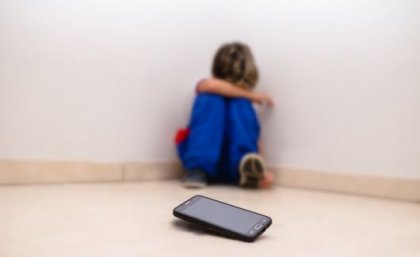
Children who spend more time on screens are at a higher risk of developing future social and emotional problems, researchers have found.
A comprehensive review of 132 longitudinal studies found higher screen use could exacerbate aggression, anxiety, attention difficulties and depression – in turn driving children to turn to screens as a coping mechanism.
Associate Professor Michael Noetel from UQ’s School of Psychology, senior author on the paper, said the study analysed more than 290,000 children worldwide, making it one of the largest of its kind.
“Our study shows screen use is a vicious cycle: we sometimes give children screens when they’re struggling, but doing so seems to make them struggle more,” Dr Noetel said.
“The problem is that screens get in the way of learning, sleep, play, and social connections that underpin healthy development.
“It’s not about banning screens – it’s about keeping an eye on their media diet.
“Use the parental controls on your TV or tablet to set reasonable limits on what they watch and how much.
“These make the rules consistent, which children find easier to follow.’’
Video gaming showed the strongest link for developing social emotional problems.
“As a kid I loved video games – they give you a challenge and powerful feedback when you’re doing a good job,’’ Dr Noetel said.
“For this reason, games are particularly tempting for children having problems and especially hard to get children away from.’’
Dr Noetel said parents and policymakers have long debated whether screens cause problems, or whether children with problems were simply drawn to screens.
“Our review shows it’s both,’’ Dr Noetel said.
“This is important because parents are often told they should cut down on screen time.
“They’re not often told how to reduce social or emotional problems, or told about the free support available to parents, like UQ-developed Triple P Program.”
“If we only address one side of the equation – cutting down on screen time but overlooking anxiety or aggression that leads kids to screens – we risk leaving children stuck in a cycle.”
PhD student Roberta Vasconcellos, from Australian Catholic University, led the study and stressed it’s not just violent shows or games that lead to problems.
“Our study found that school-aged children are particularly vulnerable,” Mrs Vasconcellos said.
“As children grow older, the risks of screen use increase.
“Older children are more likely to exceed guidelines and rely more on screens to manage their anxiety, hyperactivity and other emotional challenges.
Mrs Vasconcellos encouraged parents to help children develop balanced habits.
“Prioritising enough sleep, play and social time can reduce their reliance on screens to cope with tough emotions,” she said.
The research is published in Psychological Bulletin, a journal of the American Psychological Association.
Media contact:
UQ Communications
communications@uq.edu.au
+61 429 056 139
.jpg)

